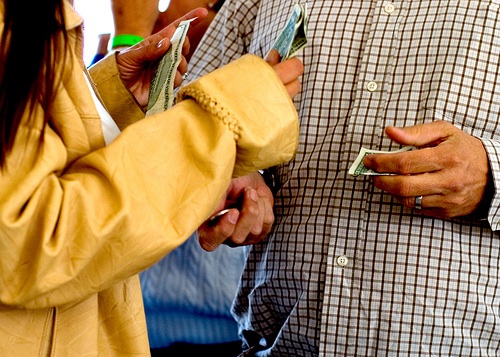 We have a tendency to live in extremes. We sometimes have a hard time walking down a middle path. For instance, some of us who have had trouble with our eating, have lived as if what we ate didn’t matter. We didn’t worry about any of the consequences. Then the New Year rolls around and we decide to drop a few pounds. We put ourselves on such a strict and controlling diet that we never get to enjoy anything. Usually, that doesn’t work and end up going right back to eating like it doesn’t matter. Some of us have spent money like it grows on trees, never balancing the checkbook, running up credit card debt, getting in to trouble. Then the New Year rolls around and we decide to get that money stuff under control. We opt for the plan Dave Ramsey ridicules deciding to hide in a cave collecting lint and only come out on coupon Thursdays. That usually doesn’t work out too well for us and we go back to spending money like water. We go back and forth from extremes that are unhealthy for us and have a hard time settling on that middle ground that is healthy and helpful.
We have a tendency to live in extremes. We sometimes have a hard time walking down a middle path. For instance, some of us who have had trouble with our eating, have lived as if what we ate didn’t matter. We didn’t worry about any of the consequences. Then the New Year rolls around and we decide to drop a few pounds. We put ourselves on such a strict and controlling diet that we never get to enjoy anything. Usually, that doesn’t work and end up going right back to eating like it doesn’t matter. Some of us have spent money like it grows on trees, never balancing the checkbook, running up credit card debt, getting in to trouble. Then the New Year rolls around and we decide to get that money stuff under control. We opt for the plan Dave Ramsey ridicules deciding to hide in a cave collecting lint and only come out on coupon Thursdays. That usually doesn’t work out too well for us and we go back to spending money like water. We go back and forth from extremes that are unhealthy for us and have a hard time settling on that middle ground that is healthy and helpful.
One area where Christians have a tendency to walk in extremes is in the area of accepting help from brethren. Instead of walking down the middle road of accepting healthy help from brethren, most of us live in extremes. At one extreme, we act like we can’t take care of ourselves and the brethren owe us help for everything. We become shameless in our pleas for help. At the other extreme, we act like we never need help. We’ve always got everything under control. We become ashamed to ask for help. Both of these extremes are wrong. Neither is healthy.
Look at the balanced approach Paul presents in II Corinthians 8:13-15 as he talked about the Christians in Corinth helping out their brethren in Judea. “For I do not mean that others should be eased and you burdened, but that as a matter of fairness your abundance at the present time should supply their need, so that their abundance may supply your need, that there may be fairness. As it is written, ‘Whoever gathered much had nothing left over, and whoever gathered little had no lack.’”
Needs arise for everyone at some time. They may be large needs involving lots of money. They may be small needs merely involving help with a meal or getting a ride somewhere. Needs arise for everyone. There is no shame in having needs. There is no shame in asking and receiving help.
Sometimes we’ll be the person needing some help. Sometimes we’ll be the person able to give the help. God set it up this way so that we could each be a blessing to each other in varying times. We should not think we are less than worthy because we’re the ones asking for help at this time. Neither should we puff up with arrogance because on this occasion we’re the ones able to offer help.
We should avoid the two extremes. Some have an entitlement mindset. If someone has something that they don’t, they are entitled to it. They become shameless in asking for help and never take personal responsibility for where they are and overcoming their own problems. They become a leech on the church and their brethren. That is wrong. Others, however, have an ashamed mindset. They are afraid to be an inconvenience to people. They are embarrassed to admit they need help or made a mistake. They feel like they just aren’t worthy to receive any help. So they never ask and they refuse help freely offered even when they could use it. If they are prevailed upon to receive help, they feel guilty and ashamed as if they’ve done something wrong by getting help. That is also wrong.
Let’s not walk in the extremes. Let’s walk in the balance that Paul talked about. We shouldn’t be leeches. At the same time, there is no shame in receiving help. Who knows but at another time we’ll be the ones giving someone a ride, fixing a meal, offering some money.
By the way, though I’ve talked about a financial need, these same principles apply in every walk of life—emotionally, physically, materially, mentally, and spiritually. Walk with a healthy balance. Avoid the extremes.
 Sunday Morning In-Person Service is Canceled
Sunday Morning In-Person Service is Canceled